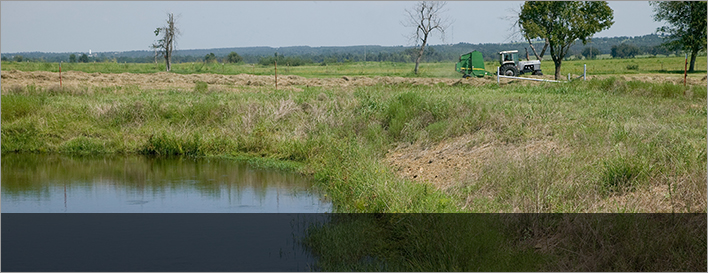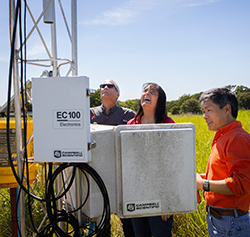Dr. Chris Zou


Dr. Chris Zou, professor of natural resource ecology and management at Oklahoma State University, is a member of the OK NSF EPSCoR Track-1 RII Award titled Socially Sustainable Solutions for Water, Carbon, and Infrastructure Resilience in Oklahoma. The $20 million EPSCoR research project is a social science-led, multi-disciplinary collaboration among social, physical, biological, engineering, and computational scientists. More than thirty researchers from across the state are working together on the project, which began July 1, 2020.

Dr. Zou spearheads research and applications at the nexus of climate change, ecology and water resources via his Ecohydrology and Ecosystem Science lab at Oklahoma State University. His research focuses primarily on understanding the ecohydrological interactions among the anthropogenic-induced changes (e.g. land-use change, land cover change, and climatic variability) and the hydrologic processes at different spatial and temporal scales. Specifically, he asks how changes in temperature, precipitation intensities and frequencies, land-use history, woody plant encroachment, energy crop production, and fire management affect ecosystem properties, functions, and dynamics. He also seeks to discover how these changes in ecosystem attributes will alter soil and hydrological processes and provide feedback to both ecosystem and atmospheric processes through vapor, carbon, and dust fluxes. The research approaches are primarily field-based but are complemented by controlled experiments and process-based modeling.
Dr. Zou's work on the OK NSF EPSCoR project addresses Focus Area 2: Terrestrial Water & Carbon Dynamics (TWCD). Through his research, Dr. Zou advances the team's goal of, "collecting and calibrating data to inform management decisions that will alter ecosystem productivity and carbon storage as well as water yield for agricultural, municipal, industrial, and ecological purposes." The TWCD focus area is central to the wicked problems facing Oklahoma because of conflicting policy narratives that shape concerns about carbon management and risks associated with landscape management practices (e.g., wildfire risks). At the same time, linkages across the TWCD and other focus areas provide opportunities to engage key stakeholder groups in discussions addressing both problem definition and potentially sustainable solution sets. Land use/carbon cycle issues play this crucial role because of the interactions among terrestrial ecosystems and carbon and water cycling, which are in turn integral components of the other impact domains addressed in this research project.
Pictured (above/right): Dr. Chris Zou, along with co-researchers Drs. Gail Wilson and Rodney Will, at a monitoring site in Oklahoma.
- Sun, X., Zou, C.B., Wilcox, B. and Stebler, E., 2019. Effect of vegetation on the energy balance and evapotranspiration in tallgrass prairie: A paired study using the eddy-covariance method. Boundary-Layer Meteorology, 170(1), pp.127-160.
- Nunes Biral, V.C., Will, R.E. and Zou, C.B., 2019. Establishment of Quercus marilandica Muenchh. and Juniperus virginiana L. in the tallgrass prairie of Oklahoma, USA increases litter inputs and soil organic carbon. Forests, 10(4), p.329.
- Zou, C., Twidwell, D., Bielski, C., Fogarty, D., Mittelstet, A., Starks, P., Will, R., Zhong, Y. and Acharya, B., 2018. Impact of eastern redcedar proliferation on water resources in the Great Plains USA—current state of knowledge. Water, 10(12), p.1768.
- Wilcox, B.P., Birt, A., Archer, S.R., Fuhlendorf, S.D., Kreuter, U.P., Sorice, M.G., van Leeuwen, W.J. and Zou, C.B., 2018. Viewing woody-plant encroachment through a social–ecological lens. BioScience, 68(9), pp.691-705.
- Qiao, L., Zou, C.B., Stebler, E. and Will, R.E., 2017. Woody plant encroachment reduces annual runoff and shifts runoff mechanisms in the tallgrass prairie, USA. Water Resources Research, 53(6), pp.4838-4849.
- Zou, C.B., Turton, D.J., Will, R.E., Engle, D.M. and Fuhlendorf, S.D., 2014. Alteration of hydrological processes and streamflow with juniper (Juniperus virginiana) encroachment in a mesic grassland catchment. Hydrological Processes, 28(26), pp.6173-6182.
- Adams, H.D., Guardiola-Claramonte, M., Barron-Gafford, G.A., Villegas, J.C., Breshears, D.D., Zou, C.B., Troch, P.A. and Huxman, T.E., 2009. Temperature sensitivity of drought-induced tree mortality portends increased regional die-off under global-change-type drought. Proceedings of the National Academy of Sciences, 106(17), pp.7063-7066.
- Breshears, D.D., Myers, O.B., Meyer, C.W., Barnes, F.J., Zou, C.B., Allen, C.D., McDowell, N.G. and Pockman, W.T., 2009. Tree die‐off in response to global change‐type drought: mortality insights from a decade of plant water potential measurements. Frontiers in Ecology and the Environment, 7(4), pp.185-189.
- Breshears, D.D., Huxman, T.E., Adams, H.D., Zou, C.B. and Davison, J.E., 2008. Vegetation synchronously leans upslope as climate warms. Proceedings of the National Academy of Sciences, 105(33), pp.11591-11592.
- Zou, C.B., Barnes, P.W., Archer, S. and McMurtry, C.R., 2005. Soil moisture redistribution as a mechanism of facilitation in savanna tree–shrub clusters. Oecologia, 145(1), pp.32-40.
